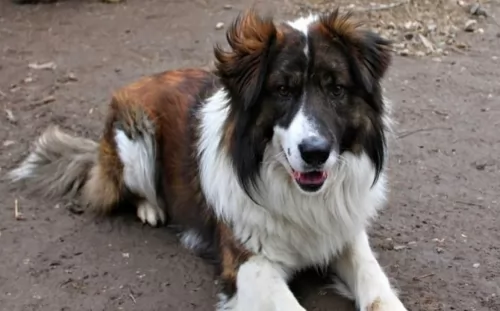 Petzlover
Petzlover Aidi is originated from Morocco but Swedish Vallhund is originated from Sweden. Aidi may grow 27 cm / 11 inches higher than Swedish Vallhund. Aidi may weigh 11 kg / 25 pounds more than Swedish Vallhund. Aidi may live 3 years less than Swedish Vallhund. Both Aidi and Swedish Vallhund has almost same litter size. Aidi requires Low Maintenance. But Swedish Vallhund requires Moderate Maintenance
Aidi is originated from Morocco but Swedish Vallhund is originated from Sweden. Aidi may grow 27 cm / 11 inches higher than Swedish Vallhund. Aidi may weigh 11 kg / 25 pounds more than Swedish Vallhund. Aidi may live 3 years less than Swedish Vallhund. Both Aidi and Swedish Vallhund has almost same litter size. Aidi requires Low Maintenance. But Swedish Vallhund requires Moderate Maintenance
 Aidi dog is also known as Berber dog. It originates from Marocco, where it has been kept to protect people from wild animals, strangers, and predators. It is considered that this breed has been utilized by the Barber tribe that is why it has a name Barber dog. Aidi has recently been protected by a club to keep its purity of the breed.
Aidi dog is also known as Berber dog. It originates from Marocco, where it has been kept to protect people from wild animals, strangers, and predators. It is considered that this breed has been utilized by the Barber tribe that is why it has a name Barber dog. Aidi has recently been protected by a club to keep its purity of the breed.
 Known also as the Västgötaspets or Swedish cow dog, the Valhund hails from Sweden. It’s a herding dog, and was always a farm dog in that country.
Known also as the Västgötaspets or Swedish cow dog, the Valhund hails from Sweden. It’s a herding dog, and was always a farm dog in that country.
It was in 1943 that the dog was first recognized as a breed by the Swedish Kennel Club. Only later, in 1996, did the American Kennel Club start registering the breed.
 Aidi dog originate country is Morocco.
A weight of the Aidi dog is 23-25kg while the height is 53-61cm. Female dogs are a little smaller than average males.
Lifespan variates from 10-12 years, but it depends on every individual.
Litter Size of Aidi is 5-8 puppies.
Other Names for Aïdi are Atlas Mountain Dog, Atlas Shepherd Dog, Berber Dog, Chien de l'Atlas, Chien de Montagne de l'Atlas, Kabyle Dog.
Aidi dog originate country is Morocco.
A weight of the Aidi dog is 23-25kg while the height is 53-61cm. Female dogs are a little smaller than average males.
Lifespan variates from 10-12 years, but it depends on every individual.
Litter Size of Aidi is 5-8 puppies.
Other Names for Aïdi are Atlas Mountain Dog, Atlas Shepherd Dog, Berber Dog, Chien de l'Atlas, Chien de Montagne de l'Atlas, Kabyle Dog.
 Looking much like a cross between a Corgi and the German Shepherd, the Swedish Valhund is a medium sized dog that stands between 30 and 34cm in height and weighs between 9 and 14kg.
Looking much like a cross between a Corgi and the German Shepherd, the Swedish Valhund is a medium sized dog that stands between 30 and 34cm in height and weighs between 9 and 14kg.
His medium length weather-resistant coat is available in wolf like shades – cream, grey, brown etc. The tail can be long or bobbed and the medium sized ears are held erect.
Intelligent, confident, independent, alert, playful and active, your Swedish Valhund promises to make a good family pet.
You'll need to be an active, outdoor type of family though, as he isn’t a couch potato type of dog, snoozing in front of the TV.
He wants to be up and about going on long walks or playing ball games that give him a good run. If he gets his fair share of exercise he can adapt to life in the city or the countryside.
He just loves his human family and wants to be constantly with them. He won’t do well if you just keep him locked outside away from everyone. He is social, alert innovative and entertaining as well as being a good guard dog.
 Aidi is an active dog who loves spending time outside in large space. They are not recommended for people who live in the apartments. They are very protective dogs, so they will be a perfect guard dog for large houses.
Aidi is an active dog who loves spending time outside in large space. They are not recommended for people who live in the apartments. They are very protective dogs, so they will be a perfect guard dog for large houses.
They are amazing with children. Aidi is a very gentle to small kids, and they tend to bond very quickly. It is very important to socialize them on time because they tend to be aggressive towards other animals and people if not properly trained. The best way to socialize them is to spend time with other pets since the early age.
Training of the Aidi might be tricky because it requires constancy and patience. It is also very important to be a firm but without any aggression towards a dog. Awarding and positive training is a must with this breed.
One of the most important things is that Aidi needs to spend a lot of time being active. They need a lot of space to be comfortable even though they do not need a lot of running.
They are very smart dogs who come from a history of guarding dogs, so proper socialization is a must. Aidi is not recommendable for the first time owners. They need a lot of practice and training to be a perfectly good pet.
 Your Swedish Valhund is such a confident, independent dog and he promises to be a loving, faithful pet. He's also alert and will let you know if strangers are approaching his property.
Your Swedish Valhund is such a confident, independent dog and he promises to be a loving, faithful pet. He's also alert and will let you know if strangers are approaching his property.
He is a calm, easy going pet and is capable of adapting to quiet or noisy homes. He may be quite a strange looking dog, but he's got a whole lot of loving to give.
 Capable of living a long, healthy life, the Swedish Valhund isn’t likely to fall victim to some of the many dog illnesses there are, and yet it is wise to be alert to some of them that he could get.
Capable of living a long, healthy life, the Swedish Valhund isn’t likely to fall victim to some of the many dog illnesses there are, and yet it is wise to be alert to some of them that he could get.
One of these is an hereditary eye disease known as retinopathy. Its where there is degeneration of the retinal photoreceptor cells. This eye disease can lead to blindness.
You need to be careful with this pet of yours, because with his long back and short legs he can so easily hurt his back if he leaps off a bed or high chair.
Whenever you pick this dog up, always support his legs and back. Don’t pick them up without supporting both the front legs and the rear end.
 Feeding Aidi dog depends on the activity and size of each individual. Overall, for a medium-sized dog with average activity 2-2.5 cups of high-quality food would be enough, but if your dog is a very active dog, you should give him extra food. They love eating, so giving your dog healthy fruit and vegetables would be a very nice treat and addition to dry food. Olive oil is also very good for your dog’s coat and digestive system.
Feeding Aidi dog depends on the activity and size of each individual. Overall, for a medium-sized dog with average activity 2-2.5 cups of high-quality food would be enough, but if your dog is a very active dog, you should give him extra food. They love eating, so giving your dog healthy fruit and vegetables would be a very nice treat and addition to dry food. Olive oil is also very good for your dog’s coat and digestive system.
Puppies need to have more meals per day, so dividing 3-4 cups of food into 3-5 meals per day should be a good amount of food for your puppy. Also, regular intake of vitamins and minerals would do a lot of benefits for the health of your dog.
Aida is a very easy dog for grooming. They have a coat that really needs a little extra attention. Few brushing on a monthly basis with an occasional bathing couple of times a year would be enough to have a perfectly groomed dog. They don’t shed a lot, so little extra brushing during the shed period is all you need.
 Try and feed your Swedish Valhund two meals a day instead of just one, so that he doesn’t gobble down his food too quickly.
Try and feed your Swedish Valhund two meals a day instead of just one, so that he doesn’t gobble down his food too quickly.
Your dog can be prone to obesity, so you have to be careful with the way you feed him. Overfeeding a dog packs on extra weight and this puts strain on the joints.
Apart from the dry kibble that you feed him, try to include some tasty, nutritious homemade food such as boiled chicken, brown rice or pasta, sweet potatoes, carrots and spinach.
This can all be chopped up and added to his dry kibble. Some raw meat added to the diet can only be to his benefit. Remember to always ensure a bowl of fresh, cool water is available.
Give his thick coat a brush twice a week to remove dead hair. Brushing also stimulates the sebaceous glands that produces oil which gives the coat is sheen.
Trim his nails because left long, they can hook onto things and rip the skin open.
Check inside the ears too for redness which could mean an ear infection.You get dog wipes that you can wipe the ear out with. There are always professional dog groomers who can do these chores for you if you don't want to.
See that his vaccines are up to date and that if he shows signs of illness, you get him to the vet.